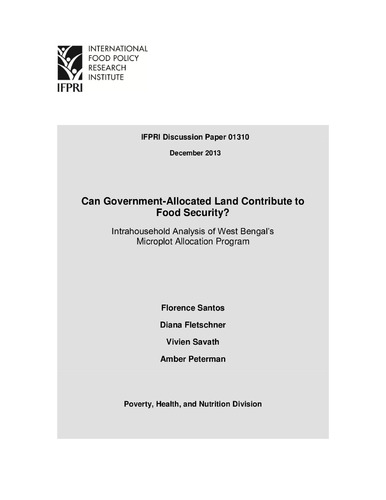Can government-allocated land contribute to food security? Intrahousehold analysis of West Bengal’s Microplot allocation program
Abstract
Secure land rights are a critical, but often overlooked, factor in achieving household food security and improved nutritional status in rural areas of developing countries. This study evaluates the impact of India’s land-allocation and registration program in West Bengal, a program that targets poor populations
and promotes the inclusion of women’s names on land titles. We use mixed methods data collected between 2010 and 2012 to examine the program’s selection of beneficiaries and a set of outcomes that are expected to lay the foundation for future food security, as well as short-term food security indicators. Our results indicate that the program’s implementation at the block level allowed for considerable variation in the processes used to select beneficiaries, to demarcate plots, to distribute titles and to provide infrastructure support. Although we were unable to detect statistically significant program effects on
current house hold food security, we find that the land-allocation and registration program has had an impact on a range of outcomes that are expected to lead to future food security: beneficiary households report stronger security, and they are more likely to take loans for agricultural purposes, to invest in agricultural improvements, and to involve women when making decisions related to food and agriculture. These effects vary with plot size—larger plots lead to larger benefits —and depend on whose names are included on the land documents; the effects are larger if women’s names are recorded on the land titles.

